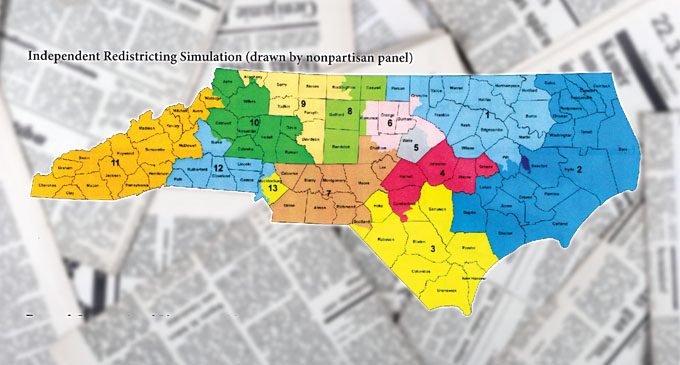Would blacks benefit from nonpartisan voting map?

BY CASH MICHAELS
FOR THE CHRONICLE
On Monday, Aug. 29, several retired state Supreme Court justices and judges – co-led by former Chief Justice Henry Frye of Greensboro –along with the nonpartisan advocacy group, Common Cause, released their simulated version of what a nonpartisan congressional map of North Carolina could look like if state lawmakers stopped using redistricting for partisan advantage.
The result – the 13 congressional districts were fairer and more competitive. In the simulation, Mecklenburg constitutes the 13th District. In the latest legislative rendering, Mecklenburg is the 12th.
If state lawmakers employed the nonpartisan approach to redrawing all 13 voting districts for 2020, when the next redistricting is scheduled, not only would N.C.’s congressional districts be constitutional, but African-American voters would still be able to elect black representation to Congress not only from the 1st and 13th Districts (which are covered by the 1965 Voting Rights Act), but possibly also the 4th District as well, says Bob Phillips, executive director of Common Cause.
And that’s because all three congressional districts, which would be predominately Democratic, would produce black-white coalitions of voters that could readily elect an African-American to Congress.
It could be done, Phillips says, if the state legislature would adopt a nonpartisan redistricting commission to draw the maps. Members of both parties have expressed interest in establishing such a panel in the past, but the lure of controlling the redistricting process exclusively for partisan goals has always won out in the end.
Several weeks ago, the U.S. Fourth Circuit Court of Appeals ruled the 2011 N.C. Congressional maps, drawn by the Republican-led N.C. General Assembly, to be unconstitutional because the 1st and 12th Districts were drawn to “stack and pack” black voters, meaning that they were moved out of swing districts to give white Republicans a better chance of winning close races with white Democrats.
In doing so, Republicans were able to dominate the North Carolina Congressional delegation 10 – 3 over Democrats, with Rep. G. K. Butterfield in the 1st, Rep. Alma Adams in the 12th, and Congressman David Price in the 4th.
Because of the appellate court ruling, the March congressional primaries had to be postponed until June with no runoff races while the legislature redrew the maps supposedly to ignore race, instead putting a premium on Republican partisanship, maintaining the 10-to-3 congressional ratio.
The 2016 map has also been challenged, but will stand until the federal courts say otherwise, if they do.
According to Phillips, the 1st, 13th and possibly the 4th are drawn to be Voting Rights Act [VRA] compliant in the new simulated nonpartisan map. Black Democratic voters in those districts control the primary process.
In the 1st District, black voters are 42 per-cent; the 13th blacks are over 34 percent, and in the 4th, blacks are over 31 percent.
Coalition voting is feasible in these areas, as proven historically elsewhere prior to the 2011 redistricting by the re-election of Sen. Dan Blue in Wake County and Sen. Floyd McKissick Jr. in Durham.
In the simulated version, because of how people are clustered across the state, says Phillips, there are several congressional districts that are decidedly Democratic, some that are predominately Republican, and possibly a handful that are considered toss-ups, meaning candidates from either party could win.
“At least that would be a map that is more in line with where we are as a state,” says Phillips.
Instead of lopsided congressional delegations like 10-3, congressional elections could easily produce more even results like 7-6. But again, state lawmakers would have to commit to establishing a nonpartisan redistricting commission.
Phillips says the next step is to continue to educate the public about the possibilities of nonpartisan redistricting, so various sessions will be held across the state, in hopes of convincing lawmakers that this is something North Carolinians want.
Republicans may pay more attention, says Phillips, especially if Democrats this fall successfully make considerable election gains in the state House and Senate, not to mention other key offices. The GOP may not want to be targeted by Democrats, Phillips says, the way Republicans targeted them when the 2020 redistricting rolls around.















